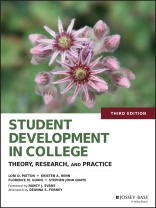THE ESSENTIAL STUDENT DEVELOPMENT REFERENCE, UPDATED WITH CUTTING-EDGE THEORY AND PRACTICE
Student Development in College is the go-to resource for student affairs, and is considered a key reference for those most committed to conscious and
intentional student affairs practice. This third edition includes new chapters on social class, disability, and emerging identity theories, with expanded coverage of
faith and gender identity. A new framework provides guidance for facilitating dialogues about theory, teaching theory, and the importance of educators as consumers
of theory. Discussion questions conclude each chapter and vignettes are woven throughout to provide practical context for theory. Learning activities in the appendix
promote comprehension and application of theory.
* Get updated on the latest in student development theory and application
* Consider both the psychosocial and cognitive aspects of identity
* Learn strategies for difficult dialogues, and the importance of reflection
* Adopt an integrated, holistic approach to complex student development issues
Student Development in College is the ideal resource for today’s multifaceted student affairs role.
'With five new or expanded chapters and critical updates throughout the text, this third edition expertly presents the complex, multifaceted, and continually
evolving nature of the theories that inform scholars and professionals in their research and practice with college students. These authors, consummately aware of the
needs of emerging and continuing student affairs professionals, have crafted a text that will be both eminently practical and intellectually engaging for graduate
students, professionals, and faculty alike.’
–Dafina-Lazarus Stewart, associate professor, higher education and student affairs, Bowling Green State University
'This third edition of Student Development in College beautifully presents the theoretical terrain of student development by honoring the foundational
theories upon which the field was developed and foregrounding newer theories with brand new content and fresh perspectives. The result is a text that is
comprehensive, sophisticated, and accessible–and one that is attuned to the contemporary realities of the complexities of student development.’
–Susan R. Jones, professor, higher education and student affairs, The Ohio State University
Spis treści
Figures and Exhibits ix
About the Authors xi
Acknowledgments xv
Preface xix
Part One: Understanding, Using, and Translating Student Development Theory 1
1 An Introduction to Student Development Theory 5
2 Foundations for Understanding Student Development Theory 19
3 Using Student Development Theory 51
Part Two: Social Identity Development 65
4 Social Identity: Concepts and Overview 71
5 Racial Identity Development 93
6 Ethnic Identity Development and Acculturation 129
7 Sexual Identity Development 156
8 Gender and Gender Identity Development 175i Contents
9 Development of Faith and Spirituality 196
10 Disability Identities and Identity Development 230
11 Social Class and Identity 243
12 Emerging Theoretical Perspectives on Student Experiences and Identities 265
Part Three: Psychosocial, Cognitive-Structural, and Integrative Development 281
13 Psychosocial Identity Development 287
14 Epistemological and Intellectual Development 314
15 Moral Development 336
16 Development of Self-Authorship 355
Part Four: Reflecting on Theory to Practice 379
17 Student Affairs Educators as Partners in Using Student Development Theory 383
18 Implications and Future Directions for Practice, Research, and Theory Development 397
Afterword 409
Appendix: Case Study Scenario: Introducing Prescott University’s Selected SAHE Graduate Students 411
References 433
Index 505
O autorze
LORI D. PATTON is an associate professor in the higher education and student affairs program at Indiana University.
KRISTEN A. RENN is a professor of higher, adult, and lifelong education at Michigan State University.
FLORENCE M. GUIDO is a professor of higher education and student affairs leadership at the University of Northern Colorado.
STEPHEN JOHN QUAYE is an associate professor in the student affairs in higher education program at Miami University.












